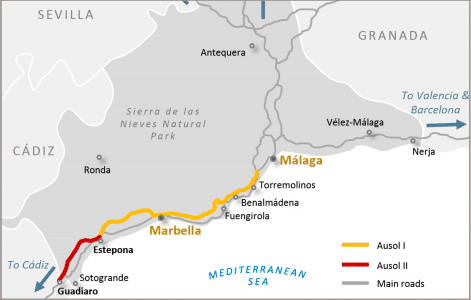Our impact
Iberian motorways
Connecting the community
Investing in motorways – connecting countries and communities with long lasting benefits
Annual reported fatalities
10%
Road fatalities per million inhabitants
57
In March 2001, the Hintze Ribeiro bridge near the town of Entre-os-Rios in the Douro Valley collapsed after a period of prolonged rain, sending a coach and three cars into the river below.
The disaster, which resulted in 59 deaths, was one of the worst in Portugal’s history. It highlighted the ageing infrastructure in one of the country’s most remote regions, as well as the nation’s poor record on
road safety.
Twenty years on, the region inland from Portugal’s second city Porto, and the centre of production for the world-renowned Port wine, has been transformed by a network of modern roads and motorways.
At the same time, road safety has maderapid progress across the country as attitudes to safety and driving habits have changed.
By 2015, road fatalities had fallen to 57 per million inhabitants from well over 150 in 2001, according to a European Commission road safety review, bringing Portugal in line with the EU average.
During that period, the number of reported fatalities in rural areas reduced from 832 to 228, representing an average (1) annual improvement of about 10%.
Motorways deliver benefits for individuals and societies as, in addition to saving lives by raising safety standards and reducing traffic volume on existing roads, they connect people to work and economic opportunities by shortening journey times and creating places for new businesses and services to spring up near those roads.
Toll roads can also deliver tax revenues directly to the State from their operations, and indirectly by helping stimulate economic growth and development in the regions and communities that they serve.
“Motorways fit very clearly within our theme of investing in mobility solutions for people and goods. Whilst they can have a significant carbon footprint, we weigh up the potential economic and social benefits of these projects.”
Ginette Borduas
Head of ESG and Sustainability at Meridiam
Meridiam’s Iberian Roads
A66 – Spain – Concessionaire Autplata
- Built between 2013-2015
- 49km highway between Benavente and Zamora
- Links Asturias (North) to Andalucia (South)
Auvisa – Spain – Concessionaire Auvisa
- Built between 2003-2005
- 74.5km highway through Consuegra to Tomelloso in the centre of Spain
- Has 14 interchanges allowing accessibility to the highway from ocal towns
- Carries more than 2 and a half million vehicles per year
A24 – Portugal – Concessionaire Norscut
- Built between 2001-2007
- 156km motorway across northern Portgual, linking Viseu in the interior and Chaves on the border with Spain
- Crosses Douro Valley some 100km east of Porto
- Links with key east-west routes: A4 from Porto, A25 from Aveiro, and A7 from Porvoa de Varzim
- Helps cut journey time from Chaves to Lisbon in half to 4.5 hours
- Carries more than 2 million vehicles per year
Ausol – Spain – Concessionaire Ausol
- Built between 1996-1999 (Ausol I) and 2000-2002 (Ausol II)
- 105km motorway from Malaga to Guadiaro
- Provides vital link to tourist entry hub in Malaga and Spain’s largest container port at Algeciras
- Cuts journey time by 60% along length of the route to 43 minutes
- Links to A-381 west towards Jerez de la Frontera and Cadiz, and AP-45 north towards Cordoba
- Carries more than 6 million vehicles per year

“When you dig into the strategy, roads can have very far-reaching benefits in terms of economic advantages for countries and communities, as well as significantly improved safety and dramatically reduced accidents and fatalities. We also look to identify opportunities for reducing carbon footprint over the projects’ life.”


